Marcus Garvey was born in St. Ann's Bay, Jamaica to Marcus Mosiah Garvey, Sr., JB a mason, and Sarah Jane Richards, a domestic worker and farmer. Of eleven siblings, only Marcus and his sister Indiana reached maturity. Garvey's father was known to have a large library, and it was from his father that Marcus gained his love for reading.
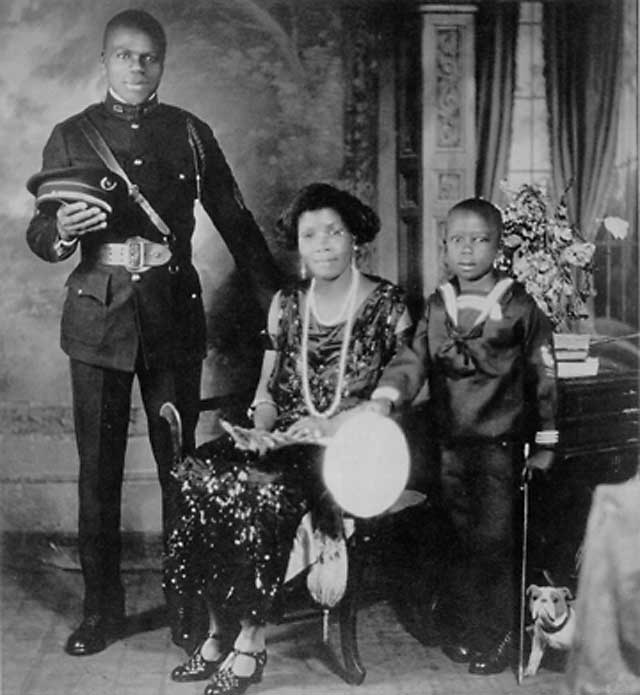
Sometime in the year 1900, Garvey entered into an apprenticeship with his uncle, Alfred Burrowes. Like Garvey Sr., Burrowes had an extensive library, of which young Garvey made good use. Garvey attended elementary schools in St. Ann's Bay and Church of England high school in Jamaica until he was about fourteen, he left St. Ann's Bay for Kingston, where he found employment as a compositor in the printing house of P. A. Benjamin, Limited.
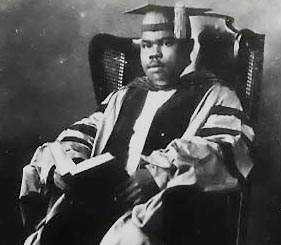
He was a master printer and foreman at Benjamin when, in November 1907, he was elected vice-president of the Kingston Union. However, he was fired when he joined a strike by printers in late 1908. Having been blacklisted for his stance in the strike, he later found work at the Government Printing Office. In 1909, his newspaper The Watchman began publication, but it only lasted for three issues.
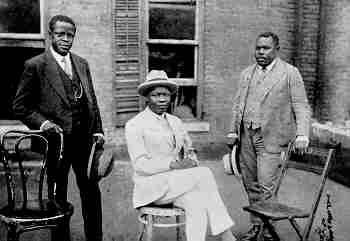
In 1910 Garvey left Jamaica and began traveling throughout the Central American region. He lived in Costa Rica for several months, where he worked as a time-keeper on a banana plantation. He began work as editor for a daily newspaper titled La Nacionale in 1911. Later that year, he moved to Colón, Panama, where he edited a biweekly newspaper before returning to Jamaica in 1912.
After years of working on the Caribbean, Garvey left Jamaica to live in London from 1912 to 1914, where he attended Birkbeck College taking classes in Law and Philosophy, worked for the African Times and Orient Review, published by Dusé Mohamed Ali, and sometimes spoke at Hyde Park's Speakers' Corner.It is said that Dusé Mohamed Ali influence shaped Garvey's speeches, and led him to organize the Universal Negro Improvement Association (UNIA) in Jamaica in 1914 (Vincent, 1971). It has been suggested that the UNIA motto, "One God, One Aim, One Destiny" originated from Duse Ali's Islamic influences on Garvey (Rashid, 2002).
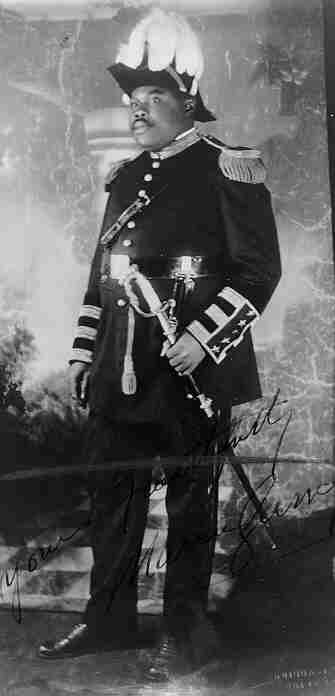
Founding and Projects of the UNIA-ACLDuring his travels, Garvey became convinced that uniting Blacks was the only way to improve their condition. Towards that end, he departed England on 14 June 1914 aboard the S.S. Trent, reaching Jamaica on 15 July 1914. He founded the Universal Negro Improvement Association (UNIA) in August 1914 as a means of uniting all of Africa and its diaspora into "one grand racial hierarchy." Amy Ashwood, who would later be Garvey's first wife, was among the founders. As the group's first President-General, Garvey's goal was "to unite all people of African ancestry of the world to one great body to establish a country and absolute government of their own."
Following much reflection the following day and night about what he learned, he named the organization the Universal Negro Improvement Association and African Communities (Imperial) League."
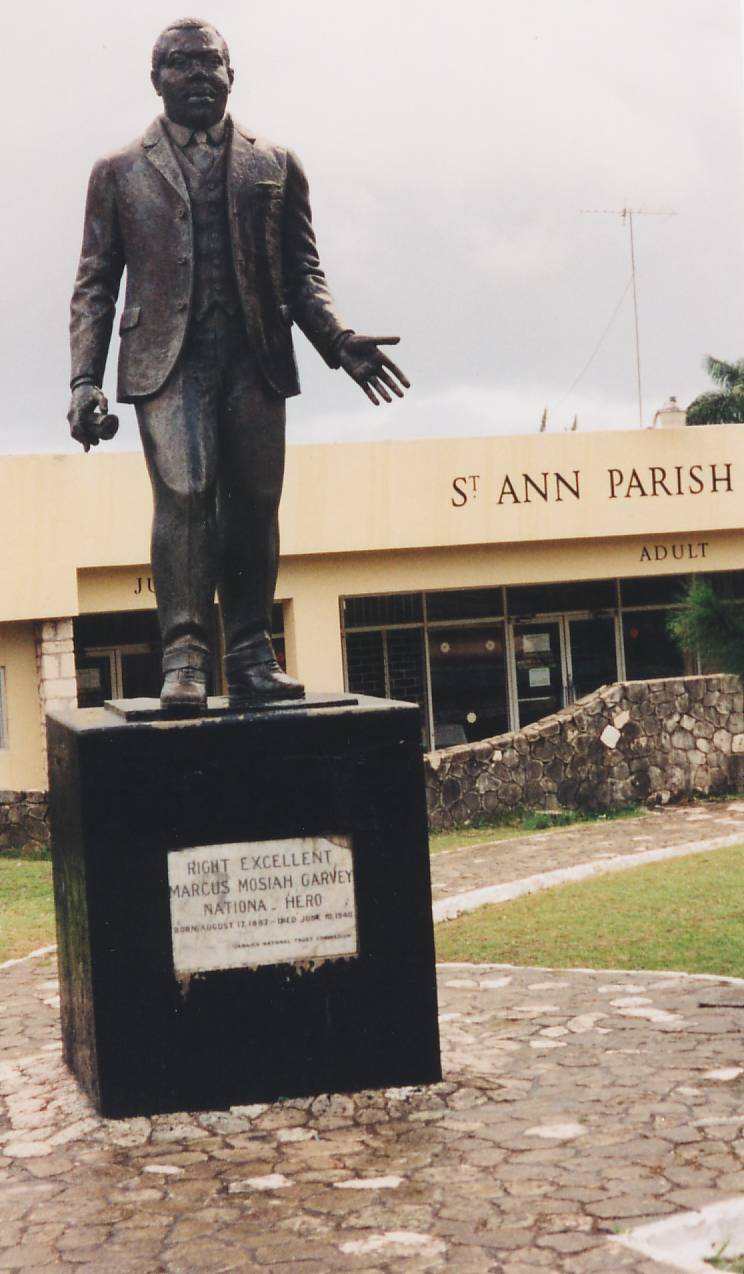
After corresponding with Booker T. Washington, Garvey arrived in the U.S. on 23 March 1916 aboard the S.S. Tallac to give a lecture tour and to raise funds to establish a school in Jamaica modeled after Washington's Tuskegee Institute. Garvey visited Tuskegee, and afterward, visited with a number of Black leaders. After moving to New York, he found work as a printer by day. He was influenced by Hubert Harrison. At night he would speak on street corners, much like he did in London's Hyde Park. It was then that Garvey perceived a leadership vacuum among people of African ancestry. On 9 May 1916, he held his first public lecture in New York City at St Mark's Church in-the-Bowery and undertook a 38-state speaking tour.
In May 1917, Garvey and thirteen others formed the first UNIA division outside Jamaica and began advancing ideas to promote social, political, and economic freedom for Blacks. On 2 July, the East St. Louis riots broke out. On July 8, Garvey delivered an address, titled "The Conspiracy of the East St. Louis Riots," at Lafayette Hall in Harlem. During the speech, he declared the riot was "one of the bloodiest outrages against mankind." By October, rancor within the UNIA had begun to set in. A split occurred in the Harlem division, with Garvey enlisted to become its leader; although he technically held the same position in Jamaica.
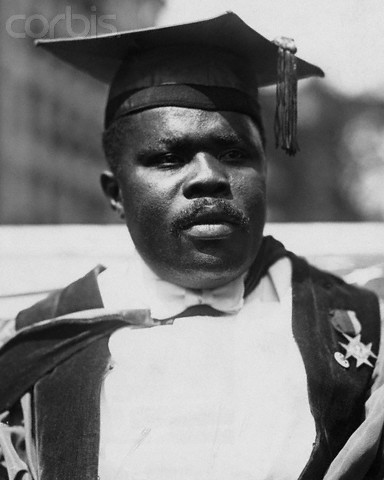
Garvey next set about the business of developing a program to improve the conditions of those of African ancestry "at home and abroad" under UNIA auspices. On 17 August 1918, publication of the widely distributed Negro World newspaper began. Garvey worked as an editor without pay until November 1920. By June 1919 the membership of the organization had grown to over two million.
On 27 June 1919, the Black Star Line of Delaware was incorporated by the members of the UNIA, with Garvey as President. By September, it obtained its first ship. Much fanfare surrounded the inspection of the S.S. Yarmouth and its rechristening as the S.S. Frederick Douglass on 14 September 1919. Such a rapid accomplishment garnered attention from many.
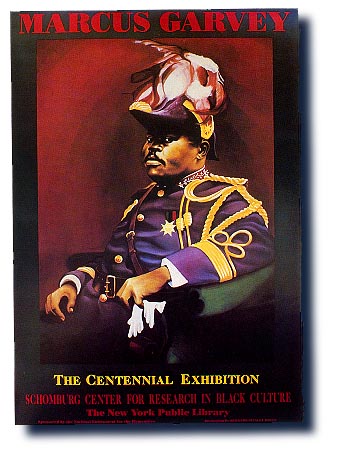
One person who noticed was Edwin P. Kilroe, Assistant District Attorney in the District Attorney's office of the County of New York. Kilroe began an investigation into the activities of the UNIA, without finding any evidence of wrongdoing or mismanagement. After being called to Kilroe's office numerous times, Garvey wrote an editorial on Kilroe's activities for the black World.
While in his Harlem office at 56 West 156th Street on 14 October 1919, Garvey received a visit from George Tyler, who told him that Kilroe "had sent him" to get Garvey. Tyler then pulled a .38-caliber revolver and fired four shots, wounding Garvey in the right leg and scalp. Garvey was taken to the hospital and Tyler arrested. The next day, it was let out that Tyler had committed suicide by leaping from the third tier of the Harlem jail as he was being taken to his arraignment.

By August 1920, the UNIA claimed four million members. That month, the International Convention of the UNIA was held. With delegates from all over the world in attendance, over 25,000 people filled Madison Square Garden on 1 August to hear Garvey speak.
Another of Garvey's ventures was the black Factories Corporation. His plan called for creating the infrastructure to manufacture every marketable commodity in every big U.S. industrial center, as well as in Central America, the West Indies, and Africa. Related endeavors included a grocery chain, restaurant, publishing house, and other businesses.
"Explanation of the Objects of the Universal black Improvement Association"
Complete 1921 speech

--------------------------------------------------------------------------------
Problems listening to this file? See media help.
Convinced that Blacks should have a permanent homeland in Africa, Garvey sought to develop Liberia.
The Liberia program, launched in 1920, was intended to build colleges, universities, industrial plants, and railroads as part of an industrial base from which to operate. However, it was abandoned in the mid-1920s after much opposition from European powers with interests in Liberia. In response to suggestions that he wanted to take all Americans of African ancestry back to Africa, he wrote, "We do not want all the blacks in Africa. Some are no good here, and naturally will be no good there."
Garvey has been credited with creating the biggest movement of people of African descent. This movement that took place in the 1920s is said to have had more participation from people of African descent than the Civil Rights Movement. In essence the UNIA was the largest Pan-African movement.
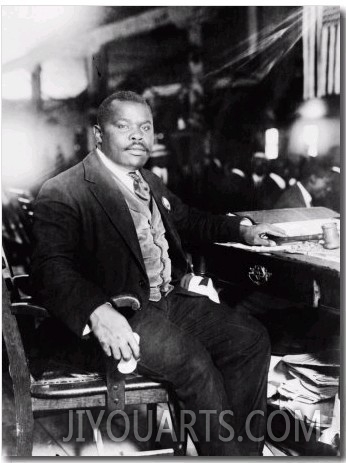
Charge of mail fraudIn a memorandum dated 11 October 1919,[ J. Edgar Hoover, special assistant to the Attorney General and head of the General Intelligence Division (or "anti-radical division") of The Bureau of Investigation or BOI (after 1935, the Federal Bureau of Investigation), wrote a memorandum to Special Agent Ridgely regarding Marcus Garvey. In the memo, Hoover wrote that,
“ Unfortunately, however, he [Garvey] has not as yet violated any federal law whereby he could be proceeded against on the grounds of being an undesirable alien, from the point of view of deportation. ”
Sometime around November 1919 an investigation by the BOI was begun into the activities of Garvey and the UNIA. Toward this end, the BOI hired James Edward Amos, Arthur Lowell Brent, Thomas Leon Jefferson, James Wormley Jones, and Earl E. Titus as its first five African-American agents. Although initial efforts by the BOI were to find grounds upon which to deport Garvey as "an undesirable alien", a charge of mail fraud was brought against Garvey in connection with stock sales of the Black Star Line after the U.S. Post Office and the Attorney General joined the investigation.
“ Look for me in the whirlwind or the storm, look for me all around you, for, with God's grace, I shall come and bring with me countless millions of blacks who have died in America and the West Indies and the millions in Africa to aid you in the fight for Liberty, Freedom and Life. ”
Later yearsIn 1928, Garvey travelled to Geneva to present the Petition of the black Race. This petition outlined the worldwide abuse of Africans to the League of Nations. In September 1929, he founded the People's Political Party (PPP), Jamaica's first modern political party, which focused on workers' rights, education, and aid to the poor.
Also in 1929, Garvey was elected councilor for the Allman Town Division of the Kingston and St. Andrew Corporation (KSAC). However, he lost his seat because of having to serve a prison sentence for contempt of court. But, in 1930, Garvey was re-elected, unopposed, along with two other PPP candidates.
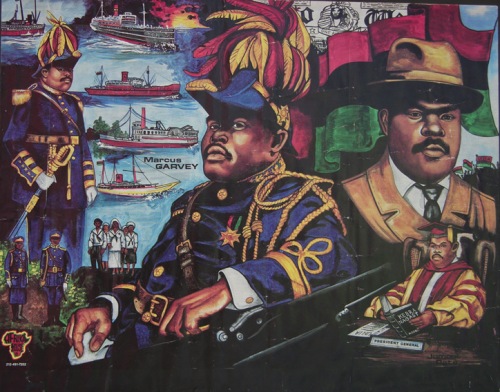
In April 1931, Garvey launched the Edelweiss Amusement Company. He set the company up to help artists earn their livelihood from their craft. Several Jamaican entertainers — Kidd Harold, Ernest Cupidon, Bim & Bam, and Ranny Williams — went on to become popular after receiving initial exposure that the company gave them.

In 1935, Garvey left Jamaica for London. He lived and worked in London until his death in 1940. During these last five years, Garvey remained active and in touch with events in war-torn Ethiopia (then known as Abyssinia) and in the West Indies. In 1937, he wrote the poem Ras Nasibu Of Ogaden in honor of Ethiopian Army Commander (Ras) Nasibu Emmanual. In 1938, he gave evidence before the West Indian Royal Commission on conditions there. Also in 1938 he set up the School of African Philosophy in Toronto to train UNIA leaders.
He continued to work on the magazine The Black Man.
During this period, Evangeline Rondon Paterson the grandmother of the 55th Governor of New York, David Paterson served as his secretary.
In 1964, his remains were exhumed and taken to Jamaica. On 15 November 1964, the government of Jamaica, having proclaimed him Jamaica's first national hero, re-interred him at a shrine in National Heroes Park.
The United States of Africa first saw light in a 1924 poem by Garvey and is still discussed.
There have been pop culture references to Marcus Garvey since he first came on the international scene.
In 2002, scholar Molefi Kete Asante listed Marcus Garvey on his list of 100 Greatest African Americans.
Rastafari and GarveyRastafarians consider Garvey a religious prophet, and sometimes even the reincarnation of Saint John the Baptist. This is partly because of his frequent statements uttered in speeches throughout the 1920s, usually along the lines of "Look to Africa, when a black king shall be crowned for the day of deliverance is at hand!"

This early Rastafari movement was also influenced by a separate, proto-Rasta movement known as the Afro-Athlican Church that was outlined in a religious text known as the Holy Piby — where Garvey was proclaimed to be a prophet as well. Thus, the Rastafari movement can be seen as an offshoot of Garveyite philosophy. As his beliefs have greatly influenced Rastafari, he is often mentioned in reggae music.

Garvey himself never identified with the Rastafari movement, and was, in fact, raised as a Methodist who went on to become a Catholic.
Garvey


Sometime in the year 1900, Garvey entered into an apprenticeship with his uncle, Alfred Burrowes. Like Garvey Sr., Burrowes had an extensive library, of which young Garvey made good use. Garvey attended elementary schools in St. Ann's Bay and Church of England high school in Jamaica until he was about fourteen, he left St. Ann's Bay for Kingston, where he found employment as a compositor in the printing house of P. A. Benjamin, Limited.

He was a master printer and foreman at Benjamin when, in November 1907, he was elected vice-president of the Kingston Union. However, he was fired when he joined a strike by printers in late 1908. Having been blacklisted for his stance in the strike, he later found work at the Government Printing Office. In 1909, his newspaper The Watchman began publication, but it only lasted for three issues.

In 1910 Garvey left Jamaica and began traveling throughout the Central American region. He lived in Costa Rica for several months, where he worked as a time-keeper on a banana plantation. He began work as editor for a daily newspaper titled La Nacionale in 1911. Later that year, he moved to Colón, Panama, where he edited a biweekly newspaper before returning to Jamaica in 1912.
After years of working on the Caribbean, Garvey left Jamaica to live in London from 1912 to 1914, where he attended Birkbeck College taking classes in Law and Philosophy, worked for the African Times and Orient Review, published by Dusé Mohamed Ali, and sometimes spoke at Hyde Park's Speakers' Corner.It is said that Dusé Mohamed Ali influence shaped Garvey's speeches, and led him to organize the Universal Negro Improvement Association (UNIA) in Jamaica in 1914 (Vincent, 1971). It has been suggested that the UNIA motto, "One God, One Aim, One Destiny" originated from Duse Ali's Islamic influences on Garvey (Rashid, 2002).

Founding and Projects of the UNIA-ACLDuring his travels, Garvey became convinced that uniting Blacks was the only way to improve their condition. Towards that end, he departed England on 14 June 1914 aboard the S.S. Trent, reaching Jamaica on 15 July 1914. He founded the Universal Negro Improvement Association (UNIA) in August 1914 as a means of uniting all of Africa and its diaspora into "one grand racial hierarchy." Amy Ashwood, who would later be Garvey's first wife, was among the founders. As the group's first President-General, Garvey's goal was "to unite all people of African ancestry of the world to one great body to establish a country and absolute government of their own."
Following much reflection the following day and night about what he learned, he named the organization the Universal Negro Improvement Association and African Communities (Imperial) League."

After corresponding with Booker T. Washington, Garvey arrived in the U.S. on 23 March 1916 aboard the S.S. Tallac to give a lecture tour and to raise funds to establish a school in Jamaica modeled after Washington's Tuskegee Institute. Garvey visited Tuskegee, and afterward, visited with a number of Black leaders. After moving to New York, he found work as a printer by day. He was influenced by Hubert Harrison. At night he would speak on street corners, much like he did in London's Hyde Park. It was then that Garvey perceived a leadership vacuum among people of African ancestry. On 9 May 1916, he held his first public lecture in New York City at St Mark's Church in-the-Bowery and undertook a 38-state speaking tour.
In May 1917, Garvey and thirteen others formed the first UNIA division outside Jamaica and began advancing ideas to promote social, political, and economic freedom for Blacks. On 2 July, the East St. Louis riots broke out. On July 8, Garvey delivered an address, titled "The Conspiracy of the East St. Louis Riots," at Lafayette Hall in Harlem. During the speech, he declared the riot was "one of the bloodiest outrages against mankind." By October, rancor within the UNIA had begun to set in. A split occurred in the Harlem division, with Garvey enlisted to become its leader; although he technically held the same position in Jamaica.

Garvey next set about the business of developing a program to improve the conditions of those of African ancestry "at home and abroad" under UNIA auspices. On 17 August 1918, publication of the widely distributed Negro World newspaper began. Garvey worked as an editor without pay until November 1920. By June 1919 the membership of the organization had grown to over two million.
On 27 June 1919, the Black Star Line of Delaware was incorporated by the members of the UNIA, with Garvey as President. By September, it obtained its first ship. Much fanfare surrounded the inspection of the S.S. Yarmouth and its rechristening as the S.S. Frederick Douglass on 14 September 1919. Such a rapid accomplishment garnered attention from many.

One person who noticed was Edwin P. Kilroe, Assistant District Attorney in the District Attorney's office of the County of New York. Kilroe began an investigation into the activities of the UNIA, without finding any evidence of wrongdoing or mismanagement. After being called to Kilroe's office numerous times, Garvey wrote an editorial on Kilroe's activities for the black World.
While in his Harlem office at 56 West 156th Street on 14 October 1919, Garvey received a visit from George Tyler, who told him that Kilroe "had sent him" to get Garvey. Tyler then pulled a .38-caliber revolver and fired four shots, wounding Garvey in the right leg and scalp. Garvey was taken to the hospital and Tyler arrested. The next day, it was let out that Tyler had committed suicide by leaping from the third tier of the Harlem jail as he was being taken to his arraignment.

By August 1920, the UNIA claimed four million members. That month, the International Convention of the UNIA was held. With delegates from all over the world in attendance, over 25,000 people filled Madison Square Garden on 1 August to hear Garvey speak.
Another of Garvey's ventures was the black Factories Corporation. His plan called for creating the infrastructure to manufacture every marketable commodity in every big U.S. industrial center, as well as in Central America, the West Indies, and Africa. Related endeavors included a grocery chain, restaurant, publishing house, and other businesses.
"Explanation of the Objects of the Universal black Improvement Association"
Complete 1921 speech

--------------------------------------------------------------------------------
Problems listening to this file? See media help.
Convinced that Blacks should have a permanent homeland in Africa, Garvey sought to develop Liberia.
The Liberia program, launched in 1920, was intended to build colleges, universities, industrial plants, and railroads as part of an industrial base from which to operate. However, it was abandoned in the mid-1920s after much opposition from European powers with interests in Liberia. In response to suggestions that he wanted to take all Americans of African ancestry back to Africa, he wrote, "We do not want all the blacks in Africa. Some are no good here, and naturally will be no good there."
Garvey has been credited with creating the biggest movement of people of African descent. This movement that took place in the 1920s is said to have had more participation from people of African descent than the Civil Rights Movement. In essence the UNIA was the largest Pan-African movement.

Charge of mail fraudIn a memorandum dated 11 October 1919,[ J. Edgar Hoover, special assistant to the Attorney General and head of the General Intelligence Division (or "anti-radical division") of The Bureau of Investigation or BOI (after 1935, the Federal Bureau of Investigation), wrote a memorandum to Special Agent Ridgely regarding Marcus Garvey. In the memo, Hoover wrote that,
“ Unfortunately, however, he [Garvey] has not as yet violated any federal law whereby he could be proceeded against on the grounds of being an undesirable alien, from the point of view of deportation. ”
Sometime around November 1919 an investigation by the BOI was begun into the activities of Garvey and the UNIA. Toward this end, the BOI hired James Edward Amos, Arthur Lowell Brent, Thomas Leon Jefferson, James Wormley Jones, and Earl E. Titus as its first five African-American agents. Although initial efforts by the BOI were to find grounds upon which to deport Garvey as "an undesirable alien", a charge of mail fraud was brought against Garvey in connection with stock sales of the Black Star Line after the U.S. Post Office and the Attorney General joined the investigation.
“ Look for me in the whirlwind or the storm, look for me all around you, for, with God's grace, I shall come and bring with me countless millions of blacks who have died in America and the West Indies and the millions in Africa to aid you in the fight for Liberty, Freedom and Life. ”
Later yearsIn 1928, Garvey travelled to Geneva to present the Petition of the black Race. This petition outlined the worldwide abuse of Africans to the League of Nations. In September 1929, he founded the People's Political Party (PPP), Jamaica's first modern political party, which focused on workers' rights, education, and aid to the poor.
Also in 1929, Garvey was elected councilor for the Allman Town Division of the Kingston and St. Andrew Corporation (KSAC). However, he lost his seat because of having to serve a prison sentence for contempt of court. But, in 1930, Garvey was re-elected, unopposed, along with two other PPP candidates.

In April 1931, Garvey launched the Edelweiss Amusement Company. He set the company up to help artists earn their livelihood from their craft. Several Jamaican entertainers — Kidd Harold, Ernest Cupidon, Bim & Bam, and Ranny Williams — went on to become popular after receiving initial exposure that the company gave them.

In 1935, Garvey left Jamaica for London. He lived and worked in London until his death in 1940. During these last five years, Garvey remained active and in touch with events in war-torn Ethiopia (then known as Abyssinia) and in the West Indies. In 1937, he wrote the poem Ras Nasibu Of Ogaden in honor of Ethiopian Army Commander (Ras) Nasibu Emmanual. In 1938, he gave evidence before the West Indian Royal Commission on conditions there. Also in 1938 he set up the School of African Philosophy in Toronto to train UNIA leaders.
He continued to work on the magazine The Black Man.
During this period, Evangeline Rondon Paterson the grandmother of the 55th Governor of New York, David Paterson served as his secretary.
In 1964, his remains were exhumed and taken to Jamaica. On 15 November 1964, the government of Jamaica, having proclaimed him Jamaica's first national hero, re-interred him at a shrine in National Heroes Park.
The United States of Africa first saw light in a 1924 poem by Garvey and is still discussed.
There have been pop culture references to Marcus Garvey since he first came on the international scene.
In 2002, scholar Molefi Kete Asante listed Marcus Garvey on his list of 100 Greatest African Americans.
Rastafari and GarveyRastafarians consider Garvey a religious prophet, and sometimes even the reincarnation of Saint John the Baptist. This is partly because of his frequent statements uttered in speeches throughout the 1920s, usually along the lines of "Look to Africa, when a black king shall be crowned for the day of deliverance is at hand!"

This early Rastafari movement was also influenced by a separate, proto-Rasta movement known as the Afro-Athlican Church that was outlined in a religious text known as the Holy Piby — where Garvey was proclaimed to be a prophet as well. Thus, the Rastafari movement can be seen as an offshoot of Garveyite philosophy. As his beliefs have greatly influenced Rastafari, he is often mentioned in reggae music.

Garvey himself never identified with the Rastafari movement, and was, in fact, raised as a Methodist who went on to become a Catholic.
Garvey



